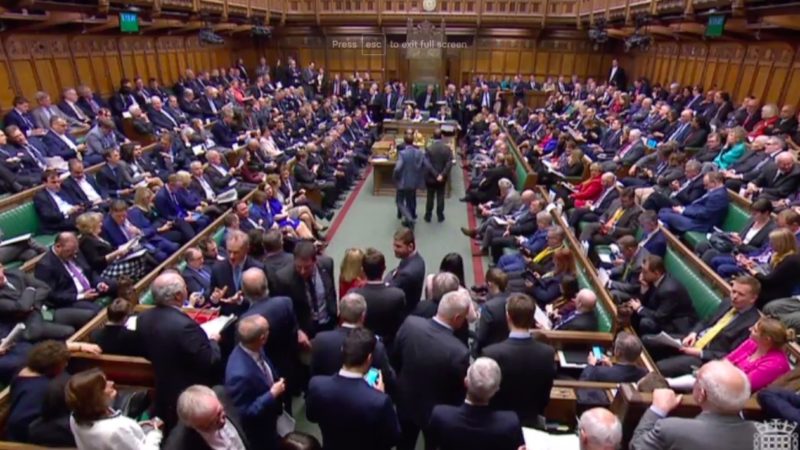
The House of Commons has voted against a public vote on the EU and against holding indicative votes in the chamber – but voted in favour of delaying Brexit. Here’s how it happened…
MPs have rejected the opportunity to legislate for another referendum in the first of a series of key Brexit votes today. Just 85 voted in favour, while 334 – a majority of MPs – were against.
Labour whipped MPs to abstain on the amendment, proposed by The Independent Group’s Dr Sarah Wollaston, which sought to extend Article 50 with the aim of legislating for a public vote on Brexit.
The party was criticised for the move by some supporters of another referendum, but the official People’s Vote campaign issued a statement that read: “We do not think today is the right time to test the will of the House on the case for a new public vote.”
Shadow ministers Yvonne Fovargue, Emma Lewell-Buck and Justin Madders defied the Labour whip to vote against a public vote, as did whip Stephanie Peacock. Ruth Smeeth also voted against and resigned from her parliamentary private secretary post.
The Commons also narrowly defeated Hilary Benn’s amendment by just two votes, with 312 in favour and 314 against, which had proposed ‘indicative votes’. If passed, this would have given some control of the parliamentary timetable to MPs and allowed them to vote on a range of Brexit solutions.
The Benn result was a narrow escape for the government. But David Lidington did announce at the despatch box earlier today that the government will facilitate indicative voting after the EU summit if MPs have not agreed a deal before that point.
MPs then voted down Labour’s official amendment, which did not explicitly endorse any alternative but simply demanded “parliamentary time for this House to find a majority for a different approach”, by 16 votes.
Labour’s Chris Bryant decided not to move his amendment to a vote as he said there was no need. His proposal called on the government to stop repeatedly bringing back Theresa May’s Brexit deal, arguing that the Prime Minister cannot keep putting forward the same motion.
Finally, MPs voted by a majority of 210 to extend Article 50 and delay Brexit. Theresa May will now request such an extension from the EU, and the 27 member states will have to unanimously agree to it.
Six Labour MPs defied the whip to vote against or abstain on extension, while seven of Theresa May’s cabinet members – Steve Barclay, Liam Fox, Chris Grayling, Penny Mordaunt, Gavin Williamson, Andrea Leadsom and Liz Truss – voted against her motion.
This evening the Brexit Secretary voted against his Government’s own motion on Brexit, which earlier in the day he had defended in the House of Commons.
That’s the equivalent of the Chancellor voting against his own Budget. This is a Government that has lost complete control. https://t.co/xGjnF3g7Ip
— Keir Starmer (@Keir_Starmer) March 14, 2019
Responding to the results, Jeremy Corbyn said: “We have begun to hold meetings with members across the House to find a consensus and a compromise that meets the needs of our country. But the last few days have also put a responsibility on the Prime Minister. First, to publicly accept that both her deal and no deal are simply no longer viable options. Secondly, to bring forward the necessary legislation to amend the exit date of 29 March.
“Tonight I reiterate our conviction that a deal can be agreed based on our alternative plan that can command support across the House. And I also reiterate our support for a public vote not as political point-scoring but as a realistic option to break the deadlock.
“The whole purpose ought to be to protect communities that are stressed and worried. Those people are worried about the future of their jobs and industries. Our job is to try to meet the concerns of the people who sent us here in the first place.”
Vote results (guide to amendments here)
Amendment (h): Ayes 85 – Noes 334
Amendment to Hilary Benn’s amendment (i): Ayes 311 – Noes 314
Amendment (i): Ayes 312 – Noes 314
Amendment (e): Ayes 302 – Noes 318
Amendment (j): Not moved
The motion to extend Article 50: Ayes 412 – Noes 202
Labour rebels
Amendment (h)
FOR (25): Tonia Antoniazzi, Ann Clwyd, Neil Coyle, Stella Creasy, Janet Daby, Geraint Davies, Rosie Duffield, Paul Farrelly, John Grogan, Meg Hillier, Ged Killen, David Lammy, Siobhain McDonagh, Anna McMorrin, Ian Murray, Albert Owen, Lloyd Russell-Moyle, Tulip Siddiq, Owen Smith, Alex Sobel, Jo Stevens, Gareth Thomas, Catherine West, Martin Whitfield, Daniel Zeichner
AGAINST (18): Kevin Barron, Ronnie Campbell, Rosie Cooper, Caroline Flint, Yvonne Fovargue, Kate Hoey, Helen Jones, Kevan Jones, Emma Lewell-Buck, Justin Madders, John Mann, Stephanie Peacock, Lloyd Russell-Moyle, Ruth Smeeth, Gareth Snell, John Spellar, Graham Stringer, Derek Twigg
(Lloyd Russell-Moyle voted both for and against, choosing to actively abstain.)
Amendment to Hilary Benn’s amendment (i):
AGAINST (6): Kevin Barron, Ronnie Campbell, Stephen Hepburn, Kate Hoey, John Mann, Graham Stringer
ABSTAINED (4): Ann Clwyd, Mike Hill, Pat McFadden, Grahame Morris
Amendment (i):
AGAINST (6): Kevin Barron, Ronnie Campbell, Caroline Flint, Kate Hoey, John Mann, Graham Stringer
ABSTAINED (3): Stephen Hepburn, Gareth Snell, John Spellar
Amendment (e):
AGAINST (1): Kevin Barron
ABSTAINED (3): Stephen Hepburn, Kate Hoey, Graham Stringer
The motion to extend Article 50:
AGAINST (3): Stephen Hepburn, Kate Hoey, Graham Stringer
ABSTAINED (3): Ronnie Campbell, Paul Farrelly, Owen Smith




More from LabourList
‘AI regulation is key to Labour’s climate credibility’
Ben Cooper column: ‘Labour needs to rediscover its own authentic populism’
‘Westminster rethought: a new purpose built site and a museum of democracy’